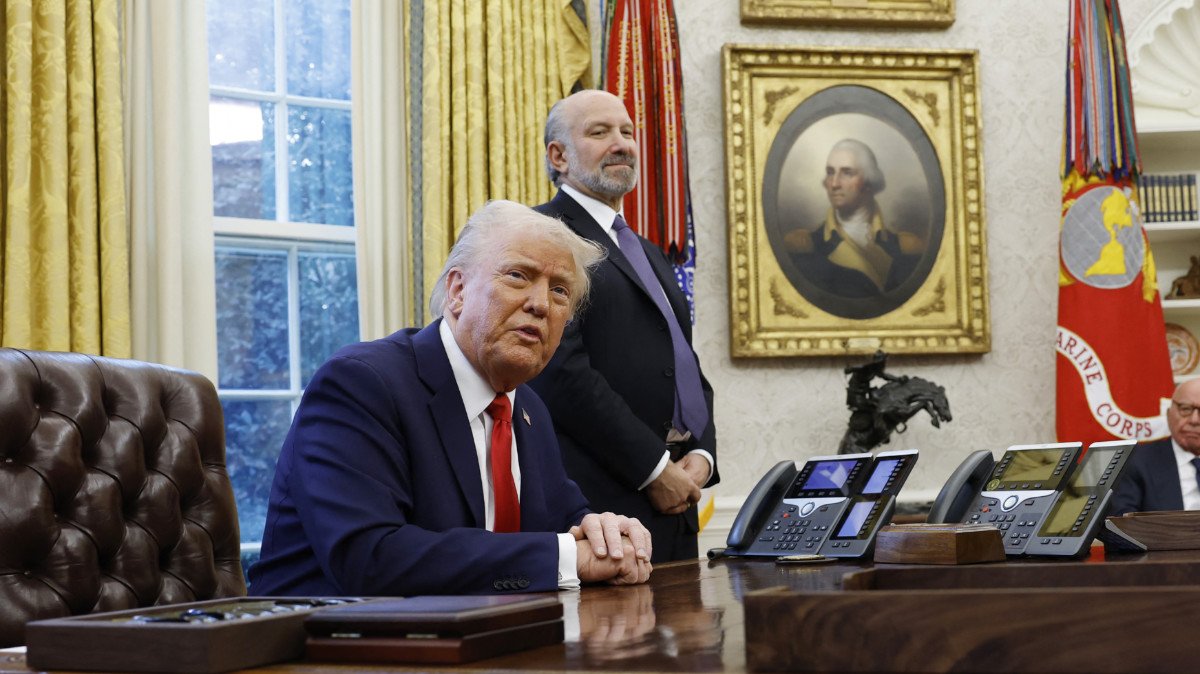Trump signed a presidential memorandum reinstating the campaign but said he would reach out to Iran to negotiate a deal

U.S. President Donald Trump speaks to reporters in the Oval Office of the White House on February 03, 2025 in Washington, DC. After signing a series of executive orders and proclamations ( Anna Moneymaker/Getty Images/AFP)
Published date: 4 February 2025 21:11 GMT | Last update: 33 min 49 sec ago
US President Donald Trump is set to resume his “maximum pressure” campaign on Iran as part of a flurry of directives signed ahead of his meeting with Israeli Prime Minister Benjamin Netanyahu.
Trump will direct his Treasury secretary to ramp up sanctions and enforcement mechanisms on Iranian oil sales in a bid to reduce its exports to zero.
Trump admitted to being “torn” about signing the measures against Iran and hoped that they would not be necessary, saying he is willing to work out a deal with Iran. He said that while Iran can never have a nuclear weapon under any circumstances, he is willing to talk to his Iranian counterpart.
Trump also said that if Iran attempted to kill him, the US would “obliterate” Iran.
Middle East Eye previously reported that the Trump administration would prioritise enforcing sanctions on Iran, including secondary sanctions on countries such as China, Iran’s main oil buyer.
New MEE newsletter: Jerusalem Dispatch
Sign up to get the latest insights and analysis on Israel-Palestine, alongside Turkey Unpacked and other MEE newsletters
On Tuesday, Trump said the US has “the right” to block Iranian oil sales to other nations.
Iranian oil exports hit a five-year high in 2024. Trump and his allies accused the Biden administration of failing to enforce sanctions while attempting to renegotiate a return to the 2015 nuclear deal, which Trump had unilaterally withdrawn from.
Iran has built up a “ghost fleet” of oil tankers to help evade sanctions. If Trump enforces secondary sanctions on China, tensions could escalate.
Trump has also threatened additional sanctions on Russia over the war in Ukraine.
However, Trump has voiced concerns about the broader impact of sanctions on the US dollar, saying shortly before the election: “I was a user of sanctions. But I put them on and take them off as quickly as possible because, ultimately, it kills your dollar, and it kills everything the dollar represents. And we have to continue to have that be the world currency.”
Trump’s move against Iran will be seen as a victory for Netanyahu, whose White House visit marks his first trip abroad since the International Criminal Court (ICC) issued an arrest warrant against him for alleged war crimes. Several European countries have said they will arrest Netanyahu if he enters their territory.
The US is not a signatory to the Rome Statute that established the ICC.
Trump signed several other executive orders, seemingly timed to coincide with Netanyahu’s visit.
Two orders signed on Tuesday include one withdrawing the US from the UN Human Rights Council (UNHRC) and another extending the suspension of funding for the UN agency for Palestinian refugees (Unrwa), Reuters reported.
According to a document obtained by Politico, the White House said: “The UNHRC has demonstrated consistent bias against Israel, focusing on it unfairly and disproportionately in council proceedings.”
The document also says that in 2018, when Trump previously withdrew, the UNHRC “passed more resolutions condemning Israel than Syria, Iran and North Korea combined”.
Both measures are somewhat symbolic. Trump had already withdrawn the US from the UNHRC during his first term, a decision that former President Joe Biden reversed upon taking office. Meanwhile, the Biden administration had already paused funding for Unrwa.
The US withdrew its support for Unrwa after Israel claimed in 2024 that its employees participated in the 7 October attack. Unrwa launched an investigation and, in response, fired nine employees who it said “may have been involved in the assault”.
Unrwa is the largest humanitarian organisation in the Gaza Strip, where it has some 13,000 staff and over 300 installations.
Israel has criticised Unrwa for decades.
Unrwa spokesperson Juliette Toumba has said the agency operates in an “exceptionally hostile environment” and is the target of “a fierce disinformation campaign”.
Meanwhile, the Trump administration has been reassessing all US foreign aid, including aid to staunch allies. Trump is also overhauling the US Agency for International Development (USAID), placing Secretary of State Marco Rubio in charge and freezing virtually all of its funding.
Middle East Eye delivers independent and unrivalled coverage and analysis of the Middle East, North Africa and beyond. To learn more about republishing this content and the associated fees, please fill out this form. More about MEE can be found here.

